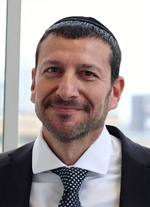Alzheimer’s, Parkinson’s Creutzfeldt-Jakob disease, amyotrophic lateral sclerosis, and dementia are associated with the accumulation of abnormal, toxic proteins in the brain. An important contributing factor is mitochondrial dysfunction. Our goal is to develop effective therapeutics.
Cardiac myopathy is one of the leading causes of death. We know the proteins involved, but not how they interact or how defects disrupt function. Our goal is to correct the defects and normalize heart/cardiovascular function. High blood pressure afflicts nearly 30% of Americans. The kidneys play a key role in blood pressure regulation. Our goal is to understand how renal defects lead to high blood pressure. Stroke is a devastating consequence of hypertension. Our goals are to understand brain metabolism, why some cells are able to survive after a stroke, and to develop agents that mitigate the consequences of stroke.
Acid-base imbalances are associated with a wide range of physiological problems, from seizures and suicidal ideation at the level of the CNS, to arrhythmias in the heart. We study the proteins that sense and regulate acid-base balance, with the goal of developing therapeutics to treat CNS and heart disease.
Inflammation occurs in many pathological processes and often leads to programmed cell death. Because the understanding of how inflammation causes cell death is poor, we study these processes to develop better therapies to regulate inflammation, and prevent the consequent death of cells in critical organs.


Unrestricted research and educational gifts do the greatest good. However, the following opportunities exist to support a specific piece of equipment or cause.
To advance knowledge of the basic physiology and biophysics of the nervous, cardiovascular, renal and immune systems, and thus their diseases through excellence in research.
To create and disseminate new knowledge in physiology, biophysics and pathophysiology through research and education.
We receive more than $8 million in research grants annually from the National Institutes of Health, the National Science Foundation, Department of Defense, national and local foundations and pharmaceutical companies. In the past 10 years we published nearly 600 research articles in major scientific journals.
We will recognize your donation by offering you a personal tour of the facility and an opportunity to meet the faculty, an acknowledgement plaque on or near equipment, an acknowledgement of your gift in each scientific publication made possible by your support, and a copy of the publications.
Although we have been successful in obtaining grants from funding agencies, support for biomedical science has fallen. The National Institutes of Health now funds less than 13% of proposals. Even when successful, these grants do not provide for major equipment and other critical needs. We can only continue our ground breaking research with your support. Unrestricted gifts do the greatest good. However, alternatively/in addition, there are opportunities to support specific pieces of equipment and causes. Any sized gift will advance the mission! For additional information contact:
Mr. Morley Schwebel
Administrative Manager
Department of Physiology and Biophysics
Case Western Reserve University
216 368-3400
morley.schwebel@case.edu
 Walter F. Boron, MD, PhD, Chair
Walter F. Boron, MD, PhD, Chair
Prof. Boron received his MD and PhD from Washington University. He then went to Yale where he became Chair of Physiology before coming to CWRU where he is now the Myers/Scarpa Chair. His research deals with acid-base diseases of the brain and kidney, as well as the role of oxygen and carbon dioxide channels in performance and pathology.
 Matthias Buck
Matthias Buck
Dr. Buck received his D.Phil. at Oxford. He then trained at Harvard and the Sloan Kettering Cancer Center before joining CWRU. His research focuses on protein-protein and protein-lipid interactions in cell signaling and migration in organ development, cancer, Alzheimer's and macular degeneration.
 Michael J. Decker, PhD
Michael J. Decker, PhD
Prof. Decker received his PhD from CWRU, followed by faculty appointments at Emory University and the Centers for Disease Control & Prevention. His research focuses on defining the neurochemical, neuroanatomical and cognitive sequelae of hypoxia induced by pathologic or environmental conditions.
 George R. Dubyak, PhD
George R. Dubyak, PhD
Prof. Dubyak received his PhD and post-doctoral training at the University of Pennsylvania before joining the faculty at CWRU. His research focuses on the cell physiology of inflammation and regulated cell death processes that contribute to diseases such as septic shock, atherosclerosis, and diabetes.
 Tingwei Mu, PhD
Tingwei Mu, PhD
Prof. Mu received his PhD from the California Institute of Technology, He then trained at the Scripps Research Institute before joining CWRU. His research focuses on correcting defects that otherwise prevent certain proteins from reaching the cell membrane. His goal is to develop approaches to treat a variety of neurological and neurodegenerative diseases, such as epilepsy and autism.
 Xin Qi, PhD
Xin Qi, PhD
Prof. Qi received her PhD from Hokkaido University. She then did a postdoctoral fellowship at Stanford University before coming to CWRU. Her research focuses on the role of mitochondrial dysfunction in the pathogenesis of neurological disorders such as Parkinson’s and Huntington’s diseases, and has led to exciting new molecules that could lead to new treatments for these presently incurable diseases.
 Rajesh Ramachandran, PhD
Rajesh Ramachandran, PhD
Prof. Ramachandran received his PhD from Texas A&M University. He then did a postdoctoral fellowship at the Scripps Research Institute before joining CWRU. His research focuses on how membranes within a cell join together or split apart. His work is important for understanding mitochondrial physiology and disease, and for treating Alzheimer's and Parkinson's diseases.
 Andrea Romani, MD, PhD
Andrea Romani, MD, PhD
Prof. Romani received his MD and PhD from the University of Siena. He did postdoctoral training in the Department of Physiology and Biophysics at CWRU. His research focuses on liver metabolism, and inflammatory changes that occur in obesity and exposure to alcohol.
 Corey Smith, PhD
Corey Smith, PhD
Prof. Smith received his PhD from the University of Colorado. He did postdoctoral training at the Max Planck Institute in Germany before joining CWRU. He studies the release of adrenaline as part of the fight or flight stress response and cardiovascular disease.
 Julian E. Stelzer, PhD
Julian E. Stelzer, PhD
rof. Stelzer received his PhD from Oregon State University. He then did postdoctoral training at the University of Wisconsin before coming to CWRU. His research focuses on the mechanisms of cardiac muscle contractile function, and how defects in this process contribute to the development and progression of heart failure.
 Witold K. Surewicz, PhD
Witold K. Surewicz, PhD
Surewicz received his PhD from the University of Lodz in Poland. He then did postdoctoral training at McMaster University before joining CWRU. His research focuses on the role of protein misfolding and aggregation in neurodegenerative diseases, including prion disorders, Alzheimer’s disease, and amyotrophic lateral sclerosis. He is working to develop new therapeutic approaches for these presently incurable3 diseases.